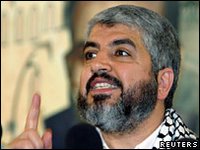Preventive Dialogue

What has happened in Moscow as a delegation from Hamas had held talks with the Russian leadership might well be called preventive diplomacy.
An effort to try to prevent things going from bad to worse.
Israel and the US have been trying to impose a political embargoe on the government of the Palestinian administration even before it has been formed. But discreetly in some cases, and more openly as in the case of the Moscow talks, this embargoe is being broken.
Just as well, in my opinion.
It is difficult to see what purpose can be served by refusing to talk to Hamas after they have captured a majority of the seats in the Palestinian parliament. A policy that made perfect sense when they were just a militant opposition group, not to speak of when they were engaged in a campaign of suicide bombings against Israel, no longer makes much sense.
And in private you would find that most European diplomats dealing with the issue agree with that statement.
There is no reason to doubt that Russian Foreign Minister Lavrov has impressed upon the Hamas delegation the need to respect previously signed agreements, to at the least acknowledge the reality of Israel and to be ready to move towards some sort of dialogue and accomodation with it.
This will not come neither easily nor fast. And it is of course somewhat difficult to ask Hamas to enter into a dialogue as long as Israel very clearly refuses any such thing with them.
It is however interesting to note that the language used by the Hamas leaders is very different from the one in the founding documents.
Then the talk was about extinguishing Israel altogether, but now it sounds like a willingness to at the least live side by side with an Israel that goes back to the 1967 frontier and also allowed refugees to come back.
Those are not demands that will cause much joy in Israel, neither are they a realistic basis for a peace, but it can not be denied that they are fairly well in line with a succession of UN Security Council resolutions over the years. As such, they can not be seen as wildly extremist.
Most important is that Hamas seems ready to extend the truce of the last year into a long-term cease-fire of some sort. It would require, they say, some sort of reprocity from the Israeli side. That will, I guess, be forthcoming if there is no violence from the Palestinian side.
Here I guess the dialogue with different international partners could be of great importance. Such a dialogue can certainly not be combined with a resumption of a campaign of violence, and it is important that this is made abundantly clear.
Looking at the situation now, it becomes even more obvious what a missed opportunity last year was.
After having been elected President in January 2005, Abu Mazen was extremely eager to enter into talks with Israel and get some sort of agreement. But time after time, Israel said that he was not the partner they wanted and refused any substantive talks.
This undoubtedly played into the hands of Hamas. Abu Mazen couldn't deliver the progress towards peace and an end to the occupation that many had hoped. And so they voted Hamas.
And now we are were we are.
More difficult to talk. But not less important. At the end of the day there is no other alternative to chaos and conflict.


<< Home